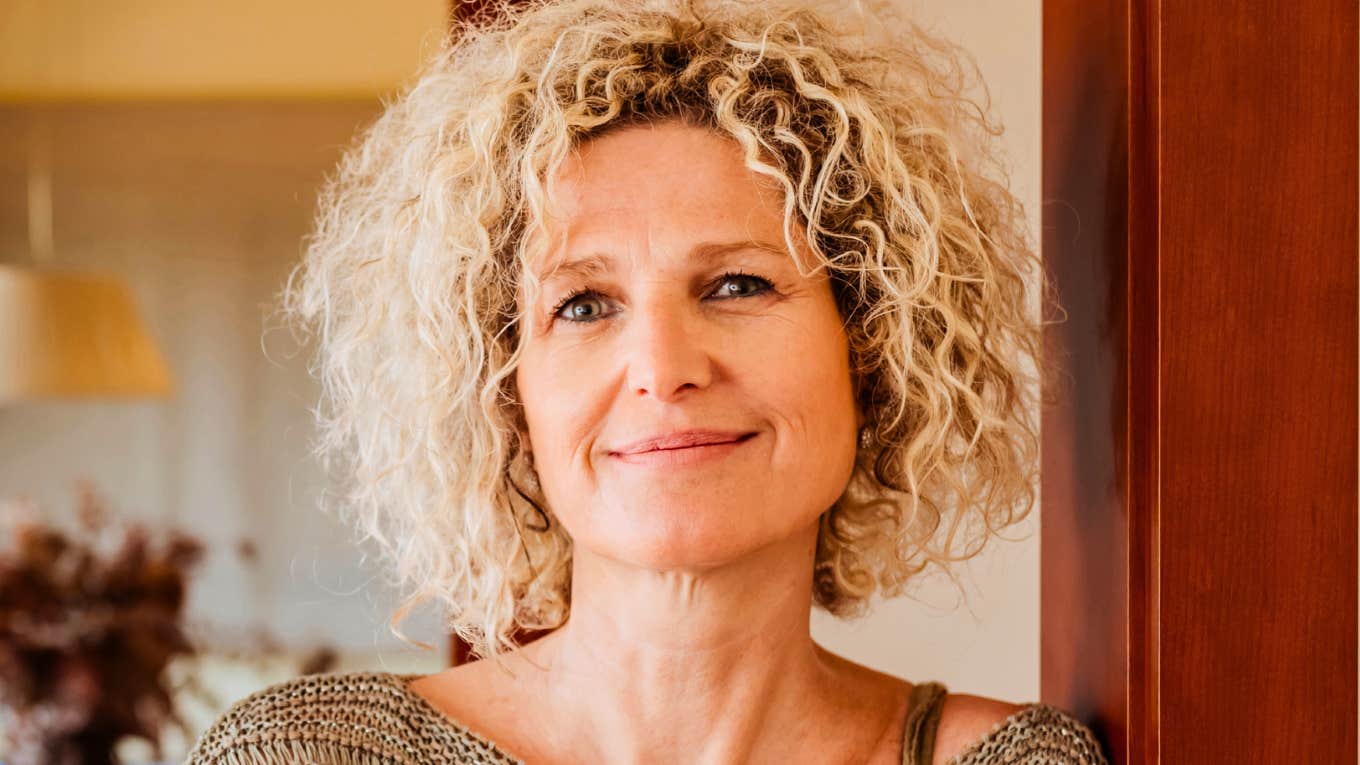The Life-Changing Magic Of No Longer Being A Wife
Sometimes you don't realize how bad a job is until you leave it.
 Carlesmiro | Shutterstock
Carlesmiro | Shutterstock I once tended bar for two months at a fancy Italian restaurant and hated every minute of it. My manager was named Esther, but I secretly referred to her as Evil Esther because she was.
Whenever she approached, the insistent, self-important click of her high heels echoed against the restaurant’s marble floors, which at least granted me a few moments to mentally prepare for everything she was about to tell me I was doing wrong.
In Esther’s defense, I was doing quite a bit wrong. At the time, my alcoholic beverage of preference was Pabst Blue Ribbon, and I had no interest in overpriced Italian wine. Nor could I afford to develop an interest.
I exhibited no grace while uncorking the bottles and gave customers blank stares when they asked about recommended food pairings, or which wines were oak aged, or how I would describe the mouthfeel. Lying has never been my strong suit.
I spent two months dragging myself to a job I hated. Then one day, about halfway through my shift, I decided I just wasn’t going to come back.
I’ll never forget the feeling when I took off my apron at the end of the night, clocked out, and simply walked away. It was like a rock had been dislodged from my chest. Over the last few months, I’d simply grown to accept its crushing weight and my gasping breath. Now that it was gone, I almost feared I might float away.
I experienced a similar life-changing feeling of no longer being a wife when I got the call from my divorce lawyer this past week.
I was walking to meet my son after school. When I heard the buzzing of my phone and saw her name illuminated on the screen, I felt the familiar blend of anxiety and dread that I’d felt before every phone call with my lawyer since the divorce was filed back in October.
She sounded giddy, which was odd. She was usually all business. A little grumpy, always harried. Up until that moment, I had been mentally and emotionally preparing to go to trial. I was still holding out hope we might settle, but things weren’t looking good.
My lawyer told me that our latest revisions to the latest offer had been accepted and the final papers had been delivered to my inbox, ready to sign.
At that moment when he told me my divorce was finalized, the sun broke through a low cloud cover and poured itself all over my face.
 Pheelings media / Shutterstock
Pheelings media / Shutterstock
Unlike my short-lived bartending gig, I couldn’t exactly clock out of my marriage. The leaving was complicated by a tedious and soul-crushing legal process that depleted everyone involved.
But just as I knew I would never again have to be a bartender under the shadow of Evil Esther, I now know I will never again have to be a wife under the shadow of a husband. That knowledge has left me feeling weightless, like I might just float away.
I was a dutiful wife for over 15 years, and even after all that time, I still winced ever so slightly when I heard myself referred to as such.
Early on, I assumed wife would be something I’d grow into eventually. After all, every title is new and strange when you first try it on.
Mama was new and strange to me at first, too, as was Mom when my daughter decided she wasn’t a baby anymore and needed to drop a syllable. Now, at 13 years old, she often pronounces Mom as a two-syllable word, usually accompanied by a head shake and an eye roll. So I’ve gotten used to being Mo-om.
It’s never taken long for me to adapt to these evolving iterations that confirm my identity as a mother. But wife never felt like it fit. I’ve never associated the word with adjectives like empowered, or smart, or even particularly kind. Instead, descriptors like subservient, superficial, and catty come to mind.
Throughout recent history, there have been two dominant perceptions and portrayals of wives.
There’s the obedient “yes dear” wife, and there’s the naggy, ball-and-chain wife. The obedient “yes, dear” wife is happily confined to the home and eternally faithful to her husband, turning a blind eye to his “male urges” that render him incapable of reciprocating her fidelity.
If her husband isn’t busy cheating, he’s busy at his Important Job (or maybe he’s busy at both), and either way, the “yes dear” wife takes it all in stride. Her place is the home, and his place is Out There, and she doesn’t ask too many questions. We vaguely pity the “yes dear” wife, but some men secretly wonder why their wives can’t be so simple and so sweet.
The naggy ball-and-chain wife is unhappily confined to the home and still eternally faithful to her husband, calling him out on his hypocrisy if he feigns helplessness over his inability to reciprocate. But this wife is no picnic. She’s usually a drag.
We roll our eyes, shake our heads. We groan whenever she opens her mouth. Women fear becoming a version of her. Sometimes we worry we already are.
In this day and age, there are undoubtedly more nuanced perceptions and portrayals of wives. But even so, while “good wives” no longer have to be housewives and while there is less tacit acceptance of male infidelity, society still grants husbands privileges Out There and still expects the house and family to be primarily a wife’s domain. It doesn’t matter how many hours wives also engage in paid labor or how many chores we assign to our “involved” husbands.
The role of wife still routinely asks us to sacrifice our careers, subsume our identities, and deprioritize our needs.
Perhaps no one better captures the predicament of the 21st-century wife than Grace in the Netflix show, Grace & Frankie. I happen to be returning to this show after falling off years ago, somewhere around Season 5, and the timing couldn’t be better.
As fans will know, Grace was left by her first husband when he came out as gay. At age 80, she remarries, hoping things will be different this time around. New Lines Magazine recaps what happens next:
Although Grace’s second marriage comes without the burden of child rearing or the lion’s share of domestic duties, being Nick’s wife immediately requires her to perform the role in the same way as marriage did the first time.
She enjoys living with her best friend Frankie, but she’s expected to move in with her husband. He assumes that she will compromise on the growth of her business to appease him.
He isn’t forthcoming about financial misdeeds, and when the consequences of his actions create trouble for Grace, she is shamed into standing by him and putting her feelings of betrayal aside. With Nick, she has gained a husband but lost the parts of herself she was finally able to access after eight decades on Earth.
Ultimately, Grace tells Nick, “I don’t think I’m interested in being a wife anymore.”
Notice she didn’t say, “your wife”; she simply said “a wife.” My sentiments exactly. Yes, there are many wives out there who feel frustrated with their husbands and with men in general. But I think if you dig deeper, the ultimate source of our frustration is, first and foremost, with the role we’re being asked to play.
Let’s just tell it like it is: the role of “wife” is a bad one.
Sure, being a husband isn’t always a walk in the park. But despite the complaining some men do, I’ve never heard a husband announce a desire to be a wife, and especially not a wife and mother.
The “traditional” husbands who still have homemaker wives — the men who feel the pressure of being The Provider, who believe themselves to be under far more stress with their Manly Responsibilities — are not clamoring for a chance to stay home with the kids.
Meanwhile, the “modern” husbands who are attempting to share financial and caregiving responsibilities with their wives understand, even if on a subconscious level, that society rewards fatherhood far more than it rewards motherhood and that as men, they are given social permission to focus more on their life outside the home, as long as they do their chores and pay some attention to the kids.
Over the years, women have fought tooth and nail for the right to participate more fully in the public sphere; men have not fought tooth and nail to assume domestic duties in the private sphere, including the duty of caring for their spouses. There is a reason for that. It’s a bad role.
To be clear, I’m not saying that being a caregiver or homemaker is inherently wrong. Domestic labor holds immense social and economic value, and it can be immensely rewarding work in the right context.
What I am saying is that performing this labor as a wife is very bad indeed. No one wants to be confined to the background of their own life story. No one wants to continually put their needs second. No one wants to be held primarily responsible for labor that society renders invisible and insignificant. No one wants to lose vital parts of who they are.
I doubt I’m the only woman who felt that assuming the role of wife, and especially the dual roles of wife + mother, made me feel like a drag. Before I became a wife, I was hardly ever a drag.
I had a lot of fun. I believed in the worth of my dreams and ambitions. I took the time I needed to pursue them. I relaxed on the weekends.
And when I gave my time and effort to the boyfriend who would become my husband, whether it was cooking a meal, or picking out a library book I thought he’d enjoy, or planning a special weekend outing — it was out of love, not a resigned sense of duty.
I’ve heard some version of this complaint from many husbands: “She used to be so fun and cool and down-to-earth. What happened?”
I know exactly what happened. She became your wife.
Many people, including me, have shared the eye-opening statistic that women initiate seven of 10 divorces. But what often doesn’t get shared is that this gender disparity is not reflected in non-marital breakups, regardless of whether or not the couple is cohabiting.
So no, women aren’t inherently difficult or have impossible relationship standards. Women specifically don’t like being wives.
 Ground Picture / Shutterstock
Ground Picture / Shutterstock
There are other “statistics” regarding lesbian divorce rates that heterosexual men often bandy about to prove that women are, in fact, The Problem.
When the UK Office of National Statistics revealed that female same-sex couples accounted for 72% of same-sex divorces in England and Wales in 2019, this was interpreted by people who can’t do math as a 72% divorce rate amongst female same-sex couples. Heterosexual men had a field day with that one, gleefully blaming women for, well, pretty much everything.
In the United States, it is difficult to find a study that even accurately tracks same-sex divorce rates, but this one from UCLA suggests that they are lower than opposite-sex divorce rates. T
he only reputable U.S. study I could find that distinguished between lesbian, gay, and heterosexual couples leveraged data from 190 families and focused exclusively on divorce rates for couples within the first five years of adopting children. In that extremely specific scenario, 12.3% of lesbian couples, 2.0% of gay male couples, and 8.3% of heterosexual couples divorced.
Why does any of this matter? Well, if same-sex couples are indeed divorcing at lower rates than heterosexual couples — and if gay male couples have the lowest divorce rates, which does seem to be the case in England and Wales — to me, this suggests that the problem is not women, but rather wives.
The problem is the role so many women have been socialized for and tacitly asked to play. When both people in a marriage are actively challenging heteronormative gender roles, and particularly when society isn’t heaping expectations of wifedom upon either party in the relationship, well then, it seems that happily ever after just might be more within reach.
As for me, there are two reasons I don’t ever plan on being a wife again.
1) I don’t trust my patriarchal conditioning, and 2) I don’t trust a husband, no matter how kind and loving and understanding he may be, to not object when we slip into patriarchal patterns of behavior.
That’s to say that despite the intense journey of unlearning that I’ve been undergoing for years now, I still live and was raised in a patriarchy. And despite the evolving roles of husbands, they too live and were raised in a patriarchy.
It’s not just husbands and wives, of course. It’s the employers who don’t grant paternity leave because they assume the wife will be the primary caregiver. It’s the ads that stalk us across the Internet when companies use their creepy tools to deduce that we’re wives, inundating us with cleaning products and baby products, and back-to-school sales.
It’s the school administrators who automatically call the wife when there’s an issue, even if the husband is listed first in the paperwork. It’s everyone who texts the wives, not the husbands, to plan social engagements and coordinate logistics.
It’s the churches that call on the wives to decorate for the Christmas party. It’s all the systems across the country that rely on the unpaid labor of wives.
Despite evolving gender roles, heterosexual wives — and sometimes homosexual wives — still find themselves entering into an implicit social contract that names us as the default caregivers and homemakers and that deems our leisure and labor less important.
And it’s that dual wife + mother role that’s the biggest doozy. Since my separation, what’s surprised me most is how much joy I derive from motherhood when I don’t also have to perform the role of wife.
I know there are women out there who have found happiness in their marriages, and please believe me when I say that I’m not trying to challenge or rain on your happiness. If a couple can unlearn together and truly manage to build a relationship based on mutual respect and appreciation, being a female partner in a committed, legally sanctioned relationship doesn't have to be awful.
But if I know two things about myself, it’s that I will never again bartend for Evil Esther at Pan E Vino, and I will never again be a wife. I might be the cool girlfriend who enjoys Saturday night dancing and Sunday morning brunch.
I might be the loyal friend who travels with her gal pals and takes up new hobbies. I might be the chill, free-range mom who lets her kids bike to friends’ houses and knock on doors asking for odd jobs. I might be the proactive neighbor who organizes block parties and street clean-ups. I might be the empty nester who works from a camper van.
But whatever happens, I will never again shrink myself, or force myself into a mold, or live with bated breath under someone else’s shadow.
I have joyfully reclaimed my ring finger, which for years was studded with a diamond that never quite fit me, and will soon be joyfully reclaiming my original last name (more on that in a bit), which I never wanted to change in the first place.
The clouds have parted. I feel simultaneously weightless and rooted in myself. It’s life-changing. It’s magical. Suddenly, at almost 45 years of age, my future is ripe with possibility.
Kerala Goodkin is an award-winning writer and co-owner of a worker-owned marketing agency. Her weekly stories are dedicated to interrupting notions of what it means to be a mother, woman, worker, and wife. She writes on Medium and has recently launched a Substack publication Mom, Interrupted.

